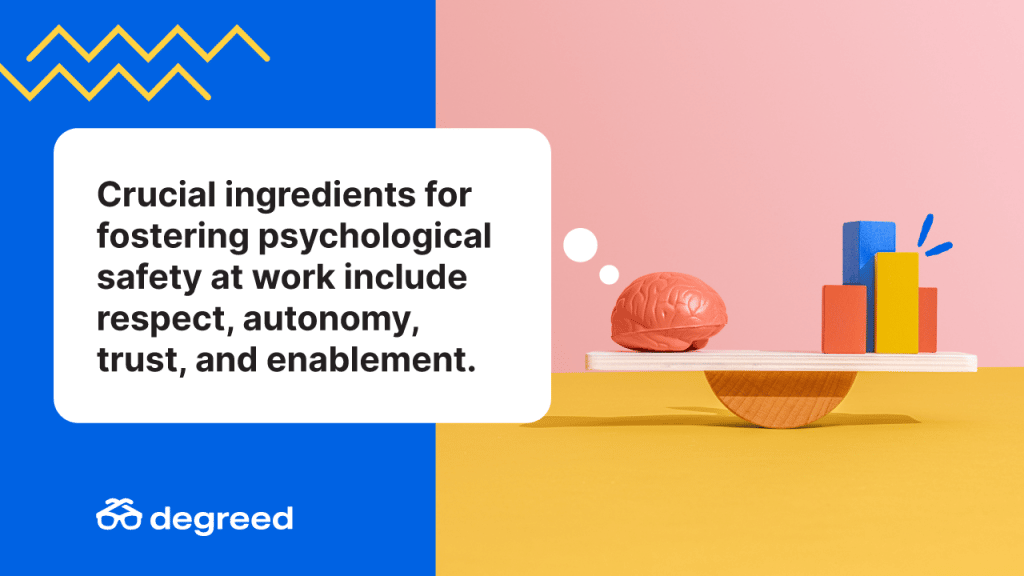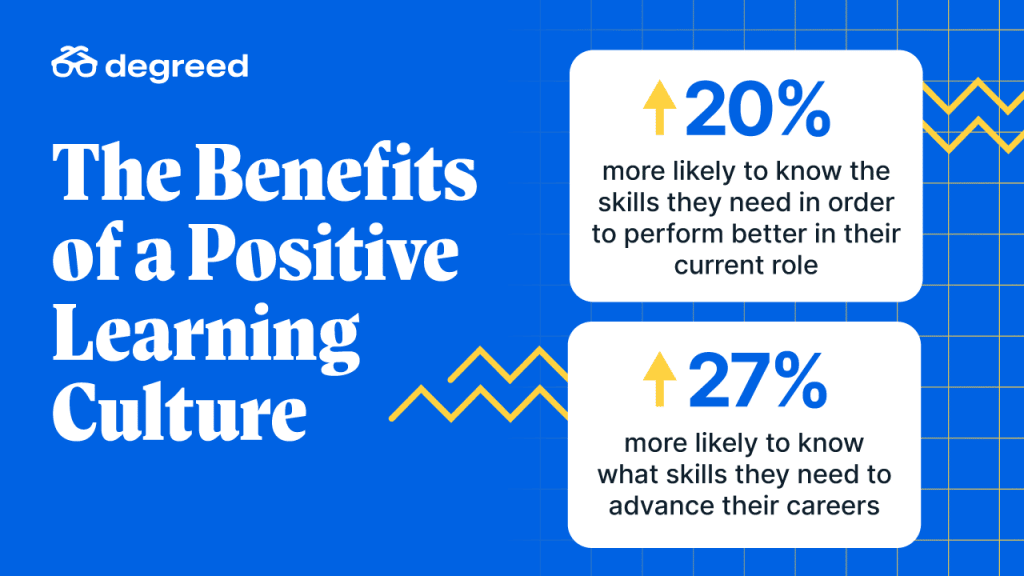We’re still buzzing from Degreed LENS Lite, our flagship virtual conference. And there’s one topic that seemed to crop up throughout presentations and conversations: psychological safety at work.
What is Psychological Safety at Work?
Even if you’ve never heard of psychological safety, you probably know how it feels. It’s the freedom to address issues without fear of punishment or pushback. It’s the confidence that you can point out a mistake without entirely knowing the solution. It’s the comfort of knowing you don’t have all the answers and that it’s okay.
During his keynote presentation at Degreed LENS Lite, organizational psychologist Adam Grant said that learning cultures thrive with two key ingredients: psychological safety and accountability. In his latest book, Think Again, The Power of Knowing What You Don’t Know, he describes what it takes to achieve such a culture. “It’s fostering a climate of respect, trust, and openness in which people can raise concerns and suggestions without fear of reprisal. It’s the foundation of a learning culture.”
Many have assumed that psychological safety encourages mistakes, but research has shown that it prevents them. In his book, Grant recounts the story of management professor Amy Edmondson. Curious about the high number of medical errors, Edmondson surveyed hospital staff members on the amount of psychological safety within their teams. Her findings didn’t support her hypothesis that better teams made fewer mistakes. Instead, she found that team members who felt more psychologically safe had higher rates of mistakes. Upon further examination, Edmonston discovered that these teams weren’t making more mistakes, they were actually making fewer. But their members were more likely to self-report their mistakes because they felt less afraid of repercussions than their counterparts who felt psychologically unsafe.
Mistakes aren’t considered failures in a functional learning culture. Instead, they’re seen as opportunities to improve. In turn, people feel supported to take risks, bring up new ideas, and address challenges head-on. A supportive environment that champions curiosity helps organizations make fewer mistakes and embrace more innovation. In fact, Google found that psychological safety at work was the most important factor in maintaining effective teams. Overall, workers in a mentally healthy workplace save time, money, and increase productivity.

Crucial ingredients for fostering psychological safety at work include respect, autonomy, trust, and enablement. You can build and support these through your learning culture; this is exactly what Degreed is about.
Historically, a top-down approach has been implemented across workplace cultures, including within learning and development. Learning leaders would identify what they want their people to learn and bring in solutions to teach them these skills. There was little room for input from the people who were doing the learning and work. As work structures have evolved, modern solutions have focused on the worker and manager experience to meet their learning needs. Degreed does just that, making it easier for people to bring in, share, and access information across your organization. Creating this space with workers in mind increases growth and engagement, making people feel more comfortable in their learning journeys.
How To Implement Psychological Safety at Work
Leading by example is crucial to creating a psychologically safe learning culture because leadership behaviors dramatically impact workers. Let’s examine how some industry leaders and world-class learning and talent organizations, all of them Degreed clients, are leading by example as they prioritize and implement psychological safety within their learning cultures.
Adam Grant: Allow Humility and Vulnerability
Grant emphasizes that leaders need to do more than simply ask for feedback when implementing psychological safety at work. Showing your people that you can take criticism is the key. “I think we need the humility and the vulnerability to be able to admit the things that we’re not yet good at, or the areas where we’re works in progress,” he told LENS Lite. “And then I think we need to extend that same opportunity to be humble and vulnerable to the people around us.”
The best way to ensure your people feel safe is by being open about your processes and challenges. It allows for transparency across your organization.
Unilever: Role Model Through Leaders
Leena Nair, CHRO at Unilever, told LENS Lite that role modeling by leaders is a core value propelling her company’s success. “We invest in our leaders to lead for learning… [We must] constantly create the environment where people feel psychologically safe to talk about their learning challenges and what they’re trying to learn and how they’re failing at it sometimes.”
When your people know that their managers won’t reprimand them for making mistakes, they become more comfortable in their learning journeys. In our How the Workforce Learns report, data shows that promoters of a learning initiative are 20% more likely to know the skills they need in order to perform better in their current role and 27% more likely to know what skills they need to advance their careers. Overall, our data shows that a positive learning culture works in tandem with management guidance. In a positive learning culture, workers are more satisfied, and promoters experience better outcomes.

Leaders can support their people’s learning journeys in a more hands-on way through mentorship or coaching opportunities and other forms of internal mobility. Using skill data from your organization, Degreed can connect people with leaders who are interested in having a mentor, mentee, or coaching relationship. Your people are also able to see full-time positions, stretch assignments, or other internal opportunities available to them based on their current skill sets. By designating certain skills as focus skills, your people can start conversations about their learning journeys with leaders. Workers are offered the chance to connect with leaders, improve their skills, and can do it in one place. This kind of support for experiential learning can help ensure that your people feel psychologically safe at work.
Whirlpool: Be Accessible
Whirlpool has an accessible and thorough process for making its people feel at ease in their learning journeys, Rayssa Medeiros, Corporate Learning & Development Sr. Manager, told LENS Lite. She emphasized the importance of leadership involvement and clear communication. “People get anxious, so you need to create this psychological safety and keep people informed.”
Whirlpool prioritizes open, honest conversations about learning. Workers identify skills that are important for their futures, and involved leaders support worker’s learning journeys, helping them personalize their goals.
Degreed helps Whirlpool make its system accessible. People have one place to learn, giving them more time to actually focus on upskilling and reskilling in preparation for the future of work. Furthermore, with a centralized system like Degreed, sharing content across an organization like Whirlpool is easy to do, breaking down barriers between leaders and workers.
FICO: Build Trust
Ensuring psychological safety during transitional periods is vital, but it’s also important to make your people feel safe every day at work. Learning leaders at FICO help do this by being open about using people’s skill data. Chrissy Chamberlain, Senior Director of Digital Learning, told LENS Lite that FICO assured workers their learning is not measured in terms of performance. “We remind colleagues that skills are not part of how we measure performance. We measure performance based on a combination of behaviors and performance-based outcomes… This allows individuals to be very honest with where they are and where they need to go.”
FICO creates personalized plans and encourages workers and managers to become active participants while measuring success over time. Aligning these plans with business goals allows for FICO to support its people in their learning journeys while continuously growing their impact. Because of this, workers feel comfortable about sharing their progress. And accordingly, they become more open and receptive to learning needs.
Data is understandably a sensitive topic in today’s world. FICO has done a great job at reassuring its people about the usage of their skill data. With Degreed, that data is used to close skills gaps, promote stretch assignments, and share new opportunities. When you align your people’s learning journeys with your company values, you’re likely to find that conversations about strengths and weaknesses, growth and mobility, and ultimate career goals come easier. This individualized and open approach can increase engagement and retention. Transparency and trust are critical components of building psychological safety at work.
Measuring Success
As workplace challenges and circumstances change, we should continually rethink what we know. The common saying, “Don’t bring me problems. Bring me solutions” is a classic case of making a work environment psychologically unsafe. Modifying your behaviors, being open to not having all the answers, and listening to your people will help you build a safe environment.
Creating psychological safety at work won’t happen immediately. People need to become comfortable with the idea and open up. It can also disappear quickly if it’s not built into the foundation of your culture.
How do you know when you’ve built a psychologically safe environment? When people feel comfortable raising issues. One suggestion Grant had was to take the idea of a suggestion box and turn it into a problem box. “[When anyone] sees anything broken — it could be a technical bug, could be a management bug or a culture bug — there’s a place to put that. It might be a Google Doc. It might be a Slack channel. But if there’s a problem box or channel, it’s a lot easier for the people who see the issues to raise them. And then you can get the people with the right skills to begin to tackle them.”
Want to learn more?
You can find all the presenters mentioned above, and more, on our On Demand page.
Join us in November for LENS LA 2021, where we’ll explore the smartest ways to harness technology and data about the skills people have (or don’t have), so you can make better investments in hiring, managing, and developing ALL of your workforce.
Visit our event page for more information and registration.
